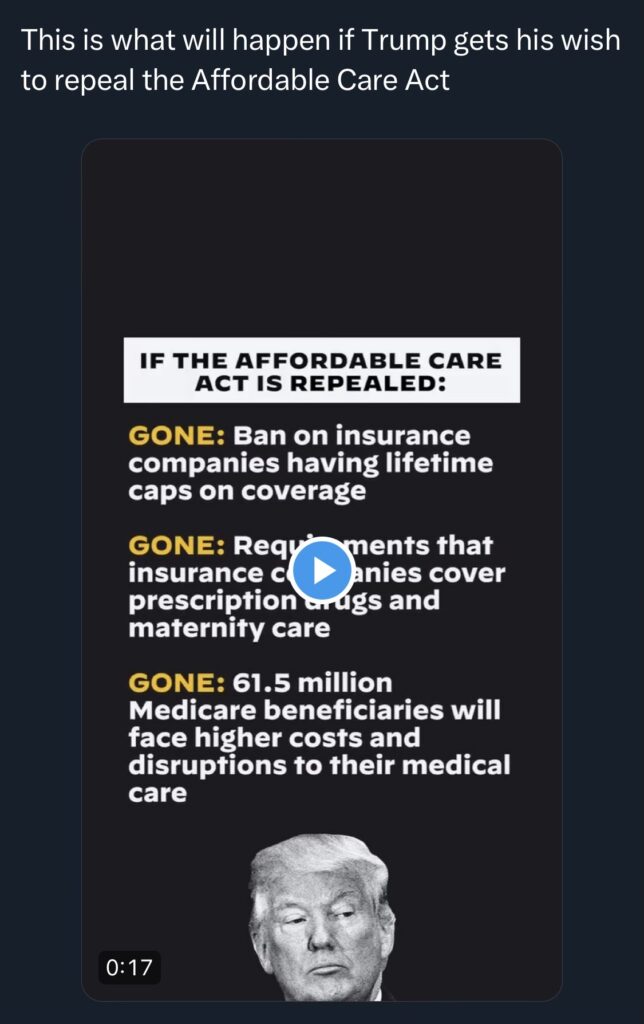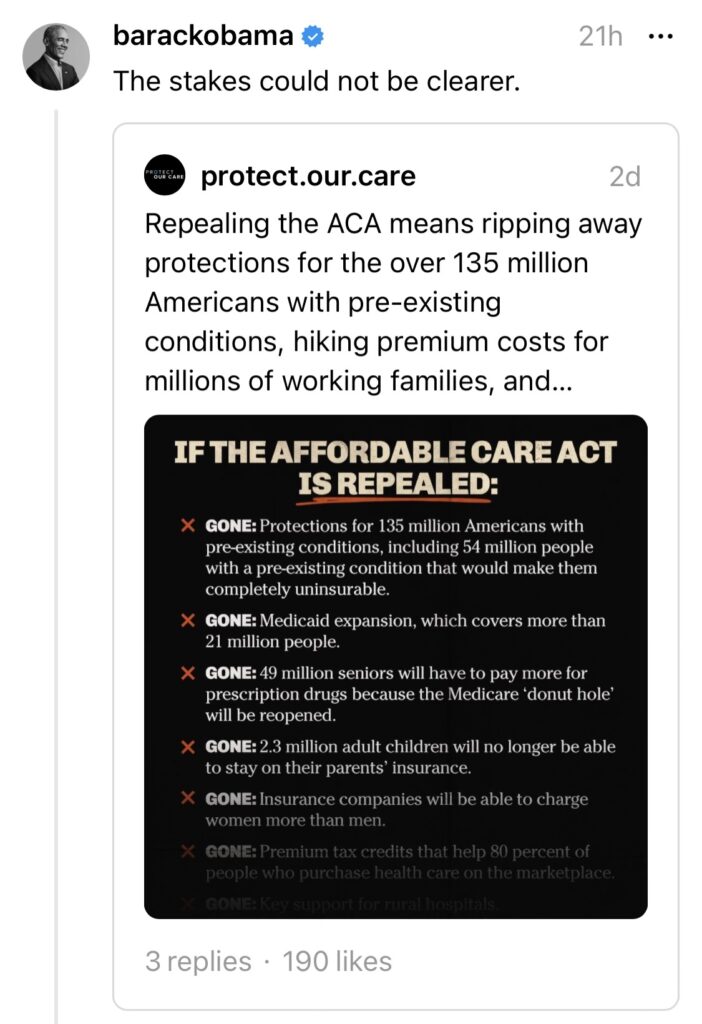Over the weekend, Donald Trump renewed calls to “terminate” the Affordable Care Act (ACA), claiming his administration’s failure to repeal the ACA was “a low point for the Republican party.” The news comes as the ACA covers more Americans than ever before, with President Biden and Democrats in Congress lowering costs and making enrollment easier. The Trump-MAGA agenda of repealing the ACA is rejected by the American people, costing Republicans at the ballot box repeatedly, and unpopular among voters of all parties.
IN THE NEWS:
The New York Times: Biden Campaign Aims to Weaponize Trump’s Threat to Obamacare. “Very few events bring aides on President Biden’s re-election campaign more joy than when former President Donald J. Trump threatens to repeal popular Democratic policies… Mr. Biden’s aides intend to once again push to make Mr. Trump and his proposals the news. ” [The New York Times, 11/27/23]
The Washington Post: Opinion: Efforts to Kill Obamacare Made it Popular. Trump Says He’ll Try Again. “Most Republican politicians have now figured out that talking about health care is a political liability, so they’ve shut up about it… Trump hasn’t gotten the message, though. Over the weekend, he declared on social media that the failure to terminate Obamacare during his presidency… If you’re wondering who is actually trying to fix such problems, though, don’t look to Republican politicians, who remain reluctant to talk about health care even when directly asked… Instead, look to President Biden, who’s implemented a bunch of little-noticed, technical measures to improve Americans’ access to care and lower their costs.” [The Washington Post, 11/28/23]
Huffpost: It Looks Like Donald Trump Still Wants To Repeal Obamacare. “Donald Trump says he is still interested in repealing the Affordable Care Act, which means health care for tens of millions of people would be in jeopardy if he becomes president again next year… Republicans, for their part, have grown relatively quiet on the topic. That may have something to do with polls showing the law to be relatively popular, as well as memories of just how much the last repeal effort alienated voters.” [Huffpost, 11/27/23]
New York Magazine: Why A Second Trump Presidency Might Try Again To Repeal Obamacare. “Under current conditions, if Republicans want to cut taxes, they would likely cause interest rates to spike, bringing immediate economic pain. They will have to cut spending if they want to cut taxes. Social spending, especially the kind that benefits the poor and the sick, is their least favorite kind of spending. The Republican Party’s traditional Reaganite wing has never accepted Obamacare specifically or the principle that people have a right to medical care generally. So while Republican elites are deeply divided over Donald Trump’s personal behavior, they are largely united in their antipathy to the Affordable Care Act. Obamacare is popular, and cutting it would risk another white-hot political backlash.” [New York Magazine, 11/27/23]
Axios: Trump Says He’s “Seriously Looking” At Obamacare Alternatives. “Former President Trump revealed that he’s “seriously looking at alternatives” to the Affordable Care Act, calling the failure to repeal and replace Obamacare during his administration “a low point for the Republican Party…” Despite having full control of the White House and Congress, Republicans’ long-running efforts to repeal and replace the ACA were defeated in 2017 when Sen. John McCain (R-Ariz.) delivered his famous thumbs-down vote on the Senate floor.” [Axios, 11/27/23]
Axios: Trump’s Obamacare Gift. “Christmas has come early for Democratic campaign staffers, courtesy of former President Trump’s vow over the holiday weekend to “never give up” on repealing and replacing the Affordable Care Act (ACA). Democrats are eager to revive their health care playbook from 2018, when the party rode a “blue wave” to the House majority by aggressively campaigning on Republican attempts to gut Obamacare… Nearly 60% of Americans had a favorable view of the ACA as of May 2023, with support steadily rising from 50% at the start of the pandemic, according to KFF tracking surveys.” [Axios, 11/27/23]
NBC News: Trump Revives Push To Eliminate Obamacare, Sparking Biden Campaign Blowback. “Republican presidential primary front-runner Donald Trump revived calls to roll back Obamacare, also known as the Affordable Care Act, if he returns to the White House… After trying and failing to repeal the ACA, and suffering for it at the ballot box, Republican candidates abandoned their calls for eliminating the law in the 2022 midterm elections, recognizing the push as a political loser. But Trump could bring it back in 2024… While unpopular when it first passed, the law has enjoyed higher public support since its most popular provisions took effect…” [NBC News, 11/27/23]
The Washington Post: Trump Wants A Do-Over On Repealing Obamacare. That Seems Unwise. “After years of Republicans effectively giving up on their long-stated goal of repealing Obamacare, Trump signaled it’s back on the table — and even a priority for him… But what’s clear is that an effort to “terminate” Obamacare is not something Americans are pining for. Not only were the GOP’s efforts to repeal and replace Obamacare during Trump’s term historically unpopular, but the law also appears to have gotten more popular since then. Perhaps most strikingly, this doesn’t even appear to be a major emphasis for the GOP base.” [The Washington Post, 11/27/23]
The Washington Post: Opinion: Here’s Why Trump Should Stop Trying To Repeal Obamacare. “Trump didn’t have to make Obamacare an issue again. It was the pre-Trump Republican Party that turned opposition to it into a cause… 13 years after Obama signed his health-care policies into law, and after multiple important revisions to them, considering Obamacare in isolation from the rest of the health-care system makes no sense. It will make even less sense in 2025, when Trump will take office again if he wins the election.” [The Washington Post, 11/27/23]
The Washington Times: Trump Says GOP Cannot Give Up On Repealing Obamacare. “Mr. Trump, writing on his social media platform, said “the cost of Obamacare is out of control, plus, it’s not good Healthcare.” “I’m seriously looking at alternatives,” he wrote over the weekend… It’s unclear whether there is much appetite among Republicans for revisiting health care. The law and its benefits are deeply entrenched… More than 18 million additional persons are eligible for Medicaid insurance because of Obamacare, and more and more red states are opting to accept generous federal funding that made Medicaid expansion possible.” [The Washington Times, 11/27/23]
The Hill: Trump Claims He Is ‘Seriously’ Looking At Obamacare Alternatives. “Trump reinjecting life into the health care debate could backfire for Republicans, who have largely given up campaigning against ObamaCare, an acknowledgment that health care is a losing issue for them… “40 million people – more than 1 in 10 Americans – have health insurance today because of the Affordable Care Act and Donald Trump just said he would try to rip it away if he returns to power. He was one vote away from getting it done when he was president – and we should take him at his word that he’ll try to do it again,” Moussa said in a statement.” [The Hill, 11/27/23]
MSNBC: Why Trump’s New Offensive Against The Affordable Care Act Matters. “Trump is inviting a political fight he’s very likely to lose. Semafor reported overnight that President Joe Biden’s re-election campaign “is eagerly planning to make the Affordable Care Act a bigger issue” in response to Trump’s missive… Ahead of his 2016 election, Trump assured voters he’d replace the Affordable Care Act with “something terrific,” but he refused to provide any details. In the years that followed, the Republican continued to assure the public he and his team would unveil an amazing health care plan that would offer more coverage at a lower cost. It’s a promise that always went unmet.” [MSNBC, 11/27/23]
Politico: Senate Republicans Shrug Off Trump’s Latest Bid To Scrap Obamacare. “Republicans still say they dislike Obamacare and want to bring health care costs down. But as far as scrapping the law? “I don’t see that as being the rallying cry. I really don’t,” Sen. Shelley Moore Capito (R-W.Va.) said… Indeed, many Republicans said if their party can reclaim the White House as well as Senate majority in 2025, they will probably try to take some action on health insurance costs, drug prices and transparency. But as far as ripping up Obamacare, as the GOP once vowed to do? Well, that ship has sailed.” [Politico, 11/27/23]
Newsweek: Donald Trump’s Obamacare Attack Could Backfire Spectacularly. “59 percent of U.S. adults have a favorable opinion about the policy when it is described as the “Affordable Care Act or Obamacare,” while 40 percent view the act unfavorably, which suggests Trump may fail to drum up support by attacking it. KFF data also shows the proportion of people enrolled in the ACA is high in key battleground states like Georgia and North Carolina. Differing stances on Obamacare could swing voters in the 2024 election… “The former president seems to have warped himself into a time machine back to 2012 where that was a smart Republican talking point. No longer.”” [Newsweek, 11/28/23]
Semafor: Trump Says He Still Wants To Repeal Obamacare. GOP Senators Say Not So Fast. “Republican Senators are reacting cautiously after Donald Trump said over the weekend that he might try to repeal the Affordable Care Act if he returns to the White House, with some suggesting another push to fully scrap the health law was unlikely… it’s unclear how much appetite exists among Republicans to try and fulfill a campaign promise that animated their party a decade ago. Sen. J.D. Vance of Ohio, a Trump ally in the Senate, said key planks of Obamacare are “broadly popular” with the American public including Republicans, such as rules barring insurers from denying coverage to individuals with pre-existing conditions or charging sick people more for healthcare.” [Semafor, 11/27/23]

 [X, @BidenHQ,
[X, @BidenHQ,  [Threads, @BarackObama,
[Threads, @BarackObama, 


